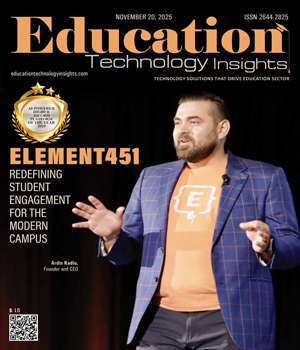THANK YOU FOR SUBSCRIBING
Be first to read the latest tech news, Industry Leader's Insights, and CIO interviews of medium and large enterprises exclusively from Education Technology Insights
The Role of Technology in Driving Better Education
Niki Bray, Director of Academic Innovation, University of Memphis School of Health Studies
 Niki Bray, Director of Academic Innovation, University of Memphis School of Health Studies
Niki Bray, Director of Academic Innovation, University of Memphis School of Health StudiesWith 25 years of experience in the education space, Niki has always been passionate about removing barriers to provide high-quality education for all learners. She began her profession as a middle school teacher and started utilizing technology. She is also passionate about sharing her experience with colleagues, conducting workshops, and giving speeches on leveraging digital tools and simple active learning practices to promote student engagement and improve learning in any modality. As a student-centered academic leader, Niki Bray strives to use her knowledge and skills around learning and universal design for all learners to create learning environments where all students' individual needs are uniquely met.
What are some of the major challenges while implementing digital learning in the education space?
Pandemic is never a reason for us to adopt the technology. I've been attempting to introduce a lot of practices for emergency scenarios, such as a student being absent for an extended period of time due to an injury or illness. I believe the lack of student access to technology at home is a roadblock to student learning. Technological advancements could eliminate the necessity for remediation classes for which students receive no credit and use adaptive learning instead. It takes a lot of effort and upper management support to implement adaptive learning as it's very expensive. What we have learned from the pandemic is the need to strengthen our professional development, particularly teacher training on how to adopt low-tech-no-tech because adaptive learning is expensive. For me, it's the perfect mesh of two, but the beauty of tech is it gets you so much data that can help drive your decisions and make it much more engaging for the students.
“We need to catch up and better address the threats and opportunities of tech, and despite current trends, there is reason to hope for better days.”
Have you been working on any recent project initiatives?
There are numerous initiatives that we are implementing and will continue doing that. I've used retrieval tactics like quizzing and assessment to flip some classes that have a high failure rate. These exercises enable students to complete multiple quizzes with unlimited attempts while mastering the content and setting a strong knowledge foundation. As a result, they remember what they learned previously when they advanced to higher classes. I tested it out and found two of my student finished their course six weeks before. Our university gives an option to take the test at a much cheaper rate than paying for the full course. They provide a study guide that you can finish in one month and then sit for the finals. I use a couple of programs like Kahoot and Quizlet that help improve your grade. Those are some of the main longstanding technology tools that have been around and are constantly getting better and more reliable with our learning management systems.
What do you think the future of education will be in the next 12 to 24 months?
Adopting technology is never so easy because of different mindsets. Some students prefer online learning, while some feel comfortable taking offline classes depending on one's perspective. But pandemic has forced everyone to take online classes and leverage technology. At the University of Memphis, we were utilizing the technology before the pandemic, and now the online class has taken center stage in students' life. They realized the actual value that the technology holds for them. We are putting a lot of effort into continuously seeing that growth at our institution. In addition, the online space offers more flexibility and personalization.
Is there any piece of advice for aspiring professionals in this field?
The best advice I could give to my colleagues is to not fall behind. It's important to stay a lifelong learner to enhance our understanding of the world around us, particularly in the digital space, and provide us with better possibilities to improve our quality of life. Some believe that technology causes more problems than it solves. I believe it's better to be careful while talking about technology as it has crept into every corner of our lives. We need to catch up and better address the threats and opportunities of tech, and despite current trends, there is reason to hope for better days. Yes, it can be used for bad purposes, but how you leverage technology is a personal choice. Simply stay happy and grateful for the good things in your life.
Read Also
The Power of International Education Collaborations
Designing Schools around Student Voice
What is Edtech Leadership in 2026
Designing Academic Leadership Around Real Lives
Why Student Success Begins with Being Seen
Inclusion is not a Department: The Systemic Ripple Effect of Belonging

I agree We use cookies on this website to enhance your user experience. By clicking any link on this page you are giving your consent for us to set cookies. More info























